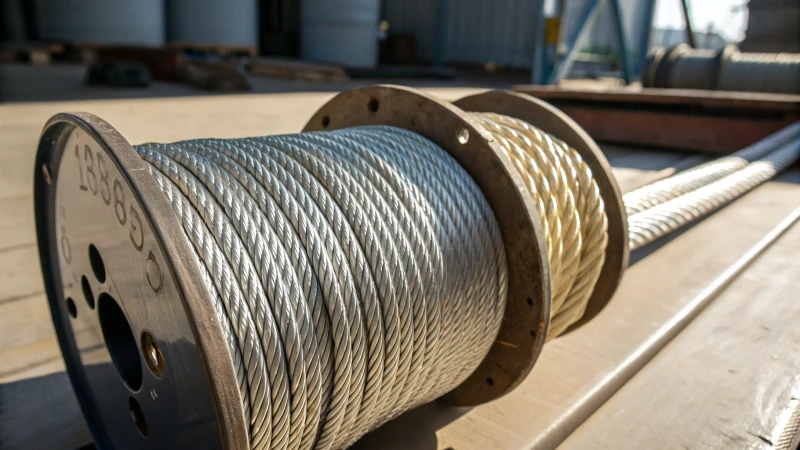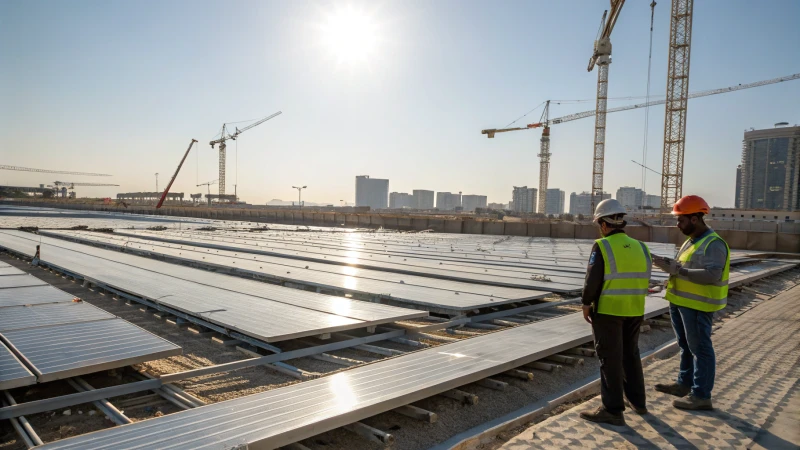
Choosing the right coating for steel wire ropes can make all the difference in their durability and performance.
Polymer coatings offer excellent abrasion resistance and flexibility, ideal for challenging environments, while metal coatings like zinc are more budget-friendly and provide effective corrosion protection. The best choice hinges on specific needs, including durability, flexibility, and cost.
I remember when I first had to decide on coatings for a project. It felt like choosing between a sturdy, reliable friend and an adaptable, agile partner. Polymer coatings seemed perfect for environments where flexibility and abrasion resistance were crucial—like when I was working on that project by the sea. The ropes with polymer coatings stood up to the salty air and harsh weather wonderfully. On the other hand, metal coatings, like zinc, reminded me of those times when budget constraints were tight, but corrosion protection was non-negotiable. I had a project in an industrial area where cost-effectiveness was key, and zinc-coated ropes did the job without breaking the bank. Whether it's the adaptability of polymers or the steadfastness of metal, understanding these differences can truly tailor your choice to your unique operational needs.
Polymer coatings are more flexible than metal coatings.True
Polymer coatings offer superior flexibility, ideal for dynamic uses.
Metal coatings provide better abrasion resistance than polymers.False
Polymer coatings excel in abrasion resistance over metal coatings.
What Are the Key Differences Between Polymer and Metal Coatings?
Imagine you're at a crossroads, choosing between two paths that promise strength and durability: polymer and metal coatings. Each has its own charm, but how do you decide which one to trust with your project?
Polymer coatings, such as polyurethane, excel in abrasion resistance, flexibility, and chemical resilience compared to metal coatings like zinc. However, their advanced properties come at a higher cost.

Composition and Application
Thinking back to the first time I had to choose a coating, I remember standing in front of shelves lined with endless options, feeling like a kid in a candy store. But I soon learned that understanding the composition is key.
Polymer Coatings: These are crafted from organic compounds, like polyurethane1 and epoxy, forming a solid layer upon curing. They’re flexible and cling like a second skin to various surfaces. It's a bit like the flexible friend who adapts to every situation.
Metal Coatings: Made from metals like zinc or aluminum, these coatings are applied through galvanization or electroplating. They stand as sentinels against corrosion, though they can be a bit stiff—imagine wearing armor, powerful but not very bendable.
Performance Characteristics
| Property | Polymer Coatings | Metal Coatings |
|---|---|---|
| Abrasion Resistance | High | Moderate |
| Flexibility | High | Low |
| Chemical Resistance | Excellent | Moderate |
| Cost | Higher | Lower |
Environmental and Safety Considerations
I once faced a dilemma while working on a project in a chemical plant. The environment was harsh, and we needed coatings that could withstand corrosive substances. Polymer coatings were the heroes of the day, boasting superb chemical resistance. However, when it comes to UV protection, metal coatings2 like zinc show their prowess, enduring sunlight without a hitch.
Industry Applications
In marine environments and chemical plants, polymer coatings shine due to their resistance to chemicals and saltwater—it's like they were made for these tough settings. On the flip side, metal coatings find their niche in structural applications where cost-effectiveness and load-bearing capacity are crucial.
Economic Considerations
Though polymer coatings might require a bigger upfront investment—up to 30% more than metal options—their long-term benefits often justify the cost. It's like choosing to buy a high-quality tool; it may be pricier initially, but it pays off with durability and performance over time. When deciding between these coatings, it’s vital to weigh both the initial cost and lifecycle performance.
Polymer coatings are more flexible than metal coatings.True
Polymer coatings offer high flexibility, while metal coatings are rigid.
Metal coatings provide better chemical resistance than polymers.False
Polymer coatings have excellent chemical resistance, unlike metal coatings.
How Do Polymer Coatings Enhance Durability in Steel Wire Ropes?
Ever wondered how steel wire ropes withstand the harshest conditions? Polymer coatings might be the unsung heroes, providing that extra layer of toughness.
Polymer coatings enhance steel wire rope durability by offering superior resistance to abrasion, flexibility, and chemical exposure. These coatings create a protective shield, extending the ropes' lifespan in various demanding industrial environments.

Understanding Polymer Coatings
I remember the first time I saw a steel wire rope with a polymer coating. It was like seeing armor for the first time—impressive and reassuring. These coatings, like polyurethane and polyamide, are more than just a shell; they’re a fortress. They shield the ropes from environmental challenges3 like moisture, chemicals, and UV rays, ensuring that the core material stays intact and reliable.
Abrasion Resistance
Imagine working in a mine or on a construction site where friction is a daily companion. Here, polymer coatings shine. They absorb impacts and minimize surface wear much better than traditional metal coatings. It’s like wearing a tough pair of boots that never seem to wear out, no matter how rough the terrain.
| Coating Type | Abrasion Resistance |
|---|---|
| Zinc | Moderate |
| Polymer | High |
Flexibility and Longevity
I once had to replace steel wire ropes frequently in a construction project due to their rigidity. With polymer-coated ropes, there’s a flexibility that feels almost human—they bend and twist without cracking. This flexibility not only reduces replacements and maintenance but also feels like a relief when handling them in complex operations. It’s akin to finding that perfect balance between strength and adaptability.
The flexibility enhancement4 can be up to 20% more than traditional coatings.
Chemical Resistance
In places like chemical plants or marine settings, where exposure is relentless, polymer coatings offer unmatched protection. I’ve seen ropes withstand corrosive environments thanks to these coatings, almost like having an invisible shield protecting them from acids, salts, and oils.
Cost vs. Performance
Now, let’s talk about money. Polymer coatings do come with a higher initial cost—about 25-30% more than zinc. However, when I factor in the long-term savings from reduced maintenance and extended lifespan, it’s clear that this upfront investment is worthwhile. It’s similar to buying a high-quality tool that outlasts cheaper options many times over.
| Factor | Polymer Coatings | Metal Coatings |
|---|---|---|
| Initial Cost | Higher | Lower |
| Maintenance Needs | Lower | Higher |
| Lifespan | Longer | Shorter |
Applications in Industry
The versatility of polymer-coated steel wire ropes is something I find fascinating. In mining, they’re prized for their resilience under harsh conditions; in construction, their flexibility enhances crane and hoist operations.
Exploring applications in marine environments5 showcases their ability to resist saltwater corrosion—a crucial factor for longevity in shipping and offshore tasks.
Polymer coatings increase wire rope lifespan by 50%.False
Polymer coatings enhance lifespan, but specific percentage increase isn't provided.
Polymer coatings offer high abrasion resistance.True
Polymer coatings absorb impacts, reducing wear in high-friction environments.
Are Metal Coatings More Cost-Effective for Large-Scale Projects?
Ever found yourself weighing the pros and cons of metal coatings for a big project? You're not alone. Let's break down why this might be your golden ticket to cost-effectiveness.
Metal coatings can be more cost-effective for large-scale projects because they offer incredible durability and a long lifespan. While they might seem pricey upfront, the savings in maintenance and replacement costs over time make them a savvy investment for extensive applications.

Understanding Metal Coatings
When I first dived into the world of metal coatings, it felt like cracking open a treasure trove of possibilities. These coatings, which are protective layers applied to metal surfaces, do so much more than just look pretty. They fend off corrosion, boost durability, and yes, even make that metal gleam. Among the popular types are zinc, galvanization, and powder coatings—each bringing its own set of perks to the table, which can seriously impact how cost-effective6 they are.
| Coating Type | Initial Cost | Maintenance Cost | Lifespan |
|---|---|---|---|
| Zinc | Low | Moderate | 5-10 years |
| Galvanization | Moderate | Low | 15-20 years |
| Powder | High | Low | 20+ years |
Factors Influencing Cost-Effectiveness
1. Project Scale and Duration
I’ve learned that with larger projects, it’s all about playing the long game. The bigger the project, the more you can spread out that initial cost, making it more economical over time. For example, galvanized steel7 shines in projects that need long-term durability against corrosion.
2. Environmental Conditions
Imagine setting up a project in a salt-laden seaside town or a snowy mountain range. Here, choosing the right coating is crucial. I’ve found that environments can dictate whether you go with something robust like powder coatings, which are fantastic at resisting harsh elements.
3. Long-Term Maintenance Savings
In my experience, the initial sticker shock of metal coatings can be offset by lower maintenance costs down the road. Take powder coatings8, for instance; their tough finish means less touch-up work and more peace of mind.
Comparing Metal Coatings to Other Options
Whenever I'm weighing options, I like to line up all the contenders. Here's a quick glance at how metal coatings stack up against paint and polymer alternatives:
| Feature | Metal Coatings | Paint | Polymer Coatings |
|---|---|---|---|
| Durability | High | Moderate | Very High |
| Cost | Moderate to High | Low | High |
| Maintenance | Low | High | Low |
This comparison really highlights why metal coatings are often favored for their longevity and low upkeep—key advantages of metal coatings9.
Industry Insights: A Closer Look
Having spoken to folks across various industries, I can say that the specific demands of your field might steer you towards metal coatings. In construction, for example, procurement managers often choose them for their robustness under heavy loads and environmental pressures. Meanwhile, in mining, it's all about strength and resistance to the elements.
Taking all these factors into account can help you decide if metal coatings align with your project's financial goals and practical needs.
Galvanization has a lifespan of 15-20 years.True
Galvanization is known for its durability, lasting 15-20 years.
Powder coatings have high maintenance costs.False
Powder coatings have low maintenance costs due to their durability.
What Environments Are Ideal for Polymer-Coated Steel Wire Ropes?
When I first discovered polymer-coated steel wire ropes, I was amazed by their resilience and versatility. But where do they truly excel? Let's dive into the environments that make these ropes a game-changer.
Polymer-coated steel wire ropes thrive in environments with intense abrasion, chemical exposure, and moisture. They're perfect for marine applications, chemical plants, and construction sites where durability and resistance are vital.

Marine Environments
I remember my first trip on a marine vessel, where the salty sea air seemed to corrode everything in sight. That's when I truly appreciated the value of polymer-coated steel wire ropes. Their superior corrosion resistance10 makes them perfect for enduring the relentless assault of saltwater, especially critical on ships and offshore platforms where longevity is essential.
| Feature | Benefit in Marine Environment |
|---|---|
| Corrosion Resistance | Prolongs rope lifespan |
| Abrasion Resistance | Reduces wear from marine equipment |
Chemical Plants
Navigating the labyrinth of a chemical plant can feel like stepping into another world, filled with the hum of machinery and the sharp tang of chemicals. In such places, polymer-coated steel wire ropes are a godsend, providing enhanced protection11 against harsh chemical reactions that would otherwise degrade traditional materials. This reliability ensures both safety and longevity amidst corrosive substances.
Construction Sites
On a bustling construction site, every piece of equipment needs to pull its weight—literally. The abrasion resistance12 of polymer coatings makes these ropes a favorite for hoisting and rigging, as they're built to withstand constant friction and heavy loads. Their flexibility allows them to bend without breaking, adapting to the dynamic stresses of construction work.
Industrial Manufacturing
In the whirlwind of an industrial manufacturing setting, where machines run non-stop, the flexibility of polymer-coated steel wire ropes is crucial. They help maintain consistent performance13, minimizing mechanical failures that could halt production lines. These ropes are not just components; they're integral to keeping the wheels of industry turning smoothly.
By understanding which environments benefit most from polymer-coated steel wire ropes, industries can enhance their operational efficiency while ensuring safety and durability. For anyone involved in modern industrial applications facing diverse environmental challenges, these ropes are not just helpful—they're essential.
Polymer-coated ropes are ideal for marine environments.True
They offer superior corrosion resistance against saltwater, enhancing durability.
Polymer coatings reduce abrasion in chemical plants.False
In chemical plants, polymer coatings mainly protect against chemical degradation.
Conclusion
Polymer coatings provide superior abrasion resistance and flexibility for steel wire ropes, while metal coatings offer cost-effective corrosion protection. The choice depends on specific project needs and budget constraints.
-
Discover how polyurethane coatings enhance durability and flexibility in various applications. ↩
-
Learn why metal coatings are effective for preventing rust and corrosion. ↩
-
Discover how polymer coatings shield steel wire ropes from environmental damage, prolonging their operational life. ↩
-
Learn why increased flexibility makes polymer-coated ropes preferable for dynamic industrial applications. ↩
-
Find out how polymer coatings offer superior protection against saltwater corrosion in marine settings. ↩
-
Explore different metal coating types to find the best fit for your project's specific needs. ↩
-
Discover why galvanized steel is favored for its corrosion resistance in construction projects. ↩
-
Learn about the durability benefits of powder coatings in industrial applications. ↩
-
Compare metal coatings with other treatments to understand their advantages in longevity and cost. ↩
-
Learn how polymer coatings protect against saltwater, crucial for marine applications. ↩
-
Discover how polymer coatings shield against chemicals, essential for plant safety. ↩
-
Explore why polymer coatings excel in abrasion resistance, vital for construction. ↩
-
Understand how flexibility in wire ropes supports manufacturing reliability. ↩

